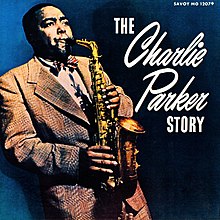
Bebop or bop is a style of jazz developed in the early to mid-1940s in the United States. The style features compositions characterized by a fast tempo, complex chord progressions with rapid chord changes and numerous changes of key, instrumental virtuosity, and improvisation based on a combination of harmonic structure, the use of scales and occasional references to the melody.

Theodore "Fats" Navarro was an American jazz trumpet player and a pioneer of the bebop style of jazz improvisation in the 1940s. A native of Key West, Florida, he toured with big bands before achieving fame as a bebop trumpeter in New York. Following a series of studio sessions with leading bebop figures including Tadd Dameron, Bud Powell, and Kenny Clarke, he became ill with tuberculosis and died at the age of 26. Despite the short duration of his career, he had a strong stylistic influence on trumpet players who rose to fame in later decades, including Clifford Brown and Lee Morgan.
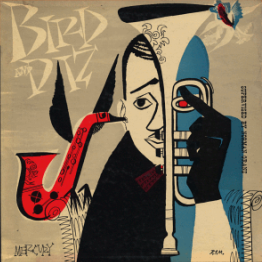
Bird and Diz is a studio album by jazz saxophonist Charlie Parker and trumpeter Dizzy Gillespie. It was recorded primarily on June 6, 1950, in New York City. Two tracks featured on the original pressing, "Passport" and "Visa", were recorded by Parker, without Gillespie and with different personnel than the other tracks, in March and May 1949. The album was originally issued in 1952 in 10" format as a collection of 78 rpm singles on the Verve subsidiary label Clef Records.

This is a list of recordings by American jazz alto saxophonist Charlie Parker ("Bird"). Parker primarily recorded for three labels: Savoy, Dial, and Verve. His work with these labels has been chronicled in box sets. Charlie Parker's Savoy and Dial Sessions have been issued on The Complete Savoy Sessions, Charlie Parker on Dial and Complete Charlie Parker on Dial and The Complete Savoy & Dial Master Takes. His Verve recordings are available on Bird: The Complete Charlie Parker on Verve and The Complete Verve Master Takes.
"Anthropology" is a bebop-style jazz composition that is credited to Charlie Parker and Dizzy Gillespie. Parker stated in 1949 that Gillespie had played no part in its writing, and that others had added the trumpeter as co-composer.
"Ko-Ko" is a 1945 bebop recording composed by Charlie Parker. The original recorded version lists Parker on alto saxophone with trumpeter Miles Davis, double bassist Curley Russell and drummer Max Roach. Due to the absence of Bud Powell, Dizzy Gillespie was enlisted to play piano, instead of his usual trumpet. Pianist Sadik Hakim, then known as Argonne Thornton, was also known to be present at the session. Rumors persist to this day about precisely who played trumpet and piano on this piece; some claim it's young Miles Davis who plays trumpet and Gillespie comping at piano, on both takes; most claim Gillespie plays trumpet and, or instead of, piano; some claim Hakim is the pianist on all or part of one or both of the takes. However, Miles Davis confirms in his autobiography that he did not play trumpet on "Ko Ko":
"I remember Bird wanting me to play "Ko-Ko," a tune that was based on the changes of "Cherokee." Now Bird knew I was having trouble playing "Cherokee" back then. So when he said that that was the tune he wanted me to play, I just said no, I wasn't going to do it. That's why Dizzy's playing trumpet on "Ko-Ko," "Warmin' up a Riff," and "Meandering" on Charlie Parker’s Reboppers, because I wasn't going to get out there and embarrass myself. I didn't really think I was ready to play tunes at the tempo of "Cherokee" and I didn't make no bones about it."
"Groovin' High" is an influential 1945 song by jazz composer and trumpeter Dizzy Gillespie. The song was a bebop mainstay that became a jazz standard, one of Gillespie's best known hits, and according to Bebop: The Music and Its Players author Thomas Owens, "the first famous bebop recording". The song is a complex musical arrangement based on the chord structure of the 1920 standard originally recorded by Paul Whiteman, "Whispering", with lyrics by John Schonberger and Richard Coburn (né Frank Reginald DeLong; 1886–1952) and music by Vincent Rose. The biography Dizzy characterizes the song as "a pleasant medium-tempo tune" that "demonstrates...[Gillespie's] skill in fashioning interesting textures using only six instruments".

Groovin' High is a 1955 compilation album of studio sessions by jazz composer and trumpeter Dizzy Gillespie. The Rough Guide to Jazz describes the album as "some of the key bebop small-group and big band recordings."

Charlie Parker on Dial: The Complete Sessions is a 1993 four-disc box set collecting jazz saxophonist and composer Charlie Parker's 1940s recordings for Dial Records. The box set, released by the English label Spotlite Records, assembled into a single package the multi-volume compilation albums the label had released by Spotlite on vinyl in the 1970s under the series title Charlie Parker on Dial. The box set has been critically well received. In 1996, a different box set collecting Parker's work with Dial was assembled by Jazz Classics and released as Complete Charlie Parker on Dial.
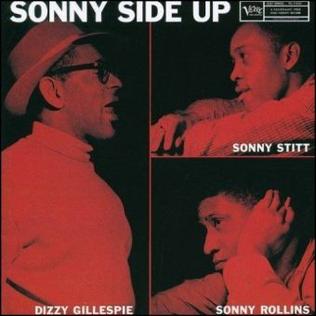
Sonny Side Up is an album by trumpeter Dizzy Gillespie, and the tenor saxophonists Sonny Stitt and Sonny Rollins, recorded in December 1957 in New York City. It was released in 1959 on producer Norman Granz's newly launched Verve label.
This article lists Charlie Parker's Savoy and Dial sessions as leader, which were recorded between 1945 and 1948.
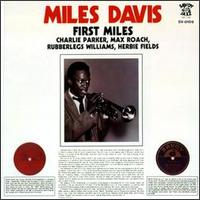
First Miles is a compilation album by American jazz musician Miles Davis, released on July 12, 1990 by Savoy Records. The album includes tracks from Davis's first recording session, backing singer Rubberlegs Williams on April 24, 1945, and the first session produced under his name, leading the members of Charlie Parker's band on August 14, 1947.

The Max Roach 4 Plays Charlie Parker is an album by American jazz drummer Max Roach featuring tracks associated with Charlie Parker recorded in late 1957 and 1958 and released on the EmArcy label. It is also the first album to feature Roach playing without a piano.

Modern Jazz Trumpets is an album released by Prestige Records in 1951 with music by four jazz trumpeters: Fats Navarro, Dizzy Gillespie, Miles Davis and Kenny Dorham. The album was released on the 10" LP format and includes the first recordings by Davis for Prestige.

Charlie Parker Memorial, Vol. 1 is an LP record by Charlie Parker, released posthumously by Savoy Records. Several tracks on this album had been previously released on other formats, but is the first 12-inch release of these master takes. It contains selections from four sessions recorded in 1947 and 1948, and contains several previously unreleased alternate takes from these sessions.

The Immortal Charlie Parker is an LP record by Charlie Parker, released posthumously by Savoy Records. Several tracks on this album had been previously released on other formats, but is the first 12-inch release of these master takes. It contains selections from five sessions recorded between 1944 and 1948, and contains several previously unreleased alternate takes from these sessions.

Charlie Parker Memorial, Vol. 2 is an LP record by Charlie Parker, released posthumously by Savoy Records. Several tracks on this album had been previously released on other formats, but is the first 12-inch release of these master takes. It contains selections from five sessions recorded between 1945 and 1948, and contains several previously unreleased alternate takes from these sessions.
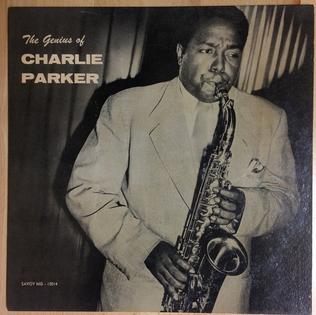
The Genius of Charlie Parker is an LP record by Charlie Parker, released posthumously by Savoy Records. All but one of tracks on this album had been previously released on other formats, but is the first 12-inch release of these master takes. It contains selections from six sessions recorded between 1944 and 1948, and contains a previously unreleased alternate take from one these sessions.
"Now's the Time" is a composition by Charlie Parker. He led the first recording of it, on November 26, 1945.
